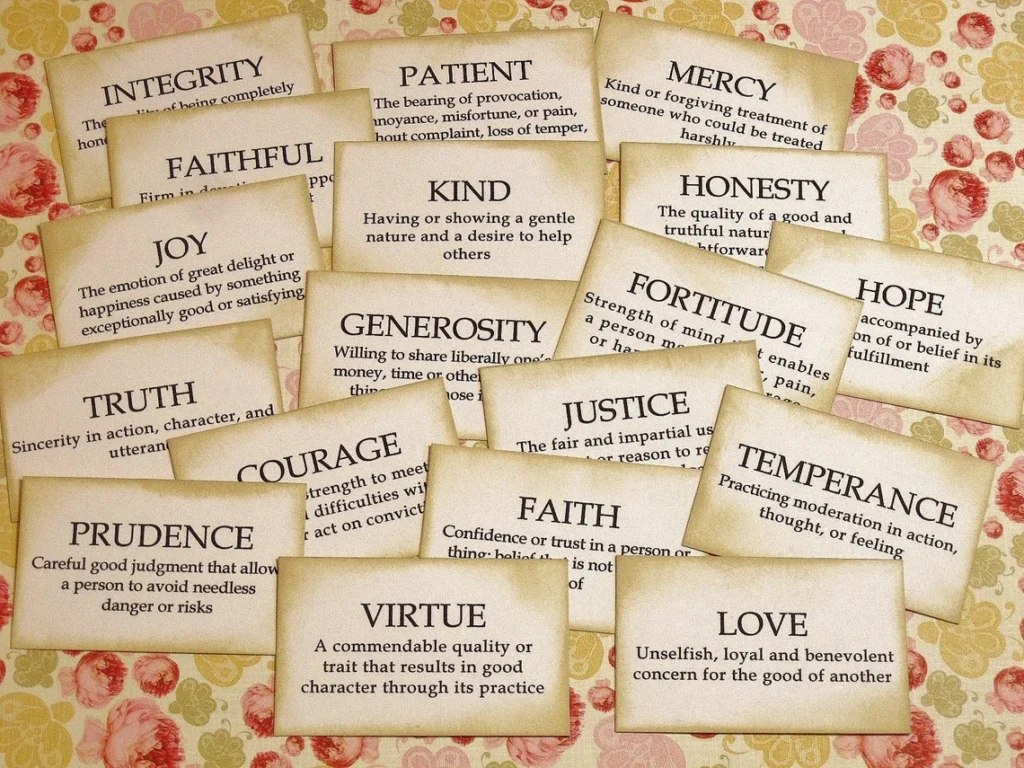

When I entered the convent, we received a chain of beads called an indicator to pin to our side. During the day we moved a bead up every time we did a good deed. This device was to motivate us to make progress in the spiritual life, to become virtuous women.
Holiness is not reserved for canonized saints. God intends all of us ordinary folk to be holy, that is, virtuous, and so make it through heaven’s gates. Jesus said, “Be perfect, therefore, as your heavenly Father is perfect” (Matthew 5:48). Face it. We will never be “perfect.” Our fallen human nature guarantees that. However, being our best selves is a reasonable goal and that means cultivating virtues.

A virtue is a good habit, which is a strength or power. In his twenties, Benjamin Franklin aimed for moral perfection. He compiled thirteen virtues and decided to focus on them one at a time. This is his list, which I found interesting…
1. TEMPERANCE. Eat not to dullness; drink not to elevation.
2. SILENCE. Speak not but what may benefit others or yourself; avoid trifling conversation.
3. ORDER. Let all your things have their places; let each part of your business have its time.
4. RESOLUTION. Resolve to perform what you ought; perform without fail what you resolve.
5. FRUGALITY. Make no expense but to do good to others or yourself; i.e., waste nothing.
6. INDUSTRY. Lose no time; be always employed in something useful; cut off all unnecessary actions.
7. SINCERITY. Use no hurtful deceit; think innocently and justly, and, if you speak, speak accordingly.
8. JUSTICE. Wrong none by doing injuries or omitting the benefits that are your duty.
9. MODERATION. Avoid extremes; forbear resenting injuries so much as you think they deserve.
10. CLEANLINESS. Tolerate no uncleanliness in body, clothes, or habitation.
11. TRANQUILLITY. Be not disturbed at trifles, or at accidents common or unavoidable.
12. CHASTITY. Rarely use venery but for health or offspring, never to dullness, weakness, or the injury of your own or another’s peace or reputation.
13. HUMILITY. Imitate Jesus and Socrates.

I just finished reading the book Saintly Habits by Andrew Whitmore. In it he explains St. Thomas Aquinas’s strategies for acquiring virtues. Here they are in a nutshell:

- Fake it till you make it. Repeat good acts with intensity.
- Overshoot the target. Aim beyond what you feel is virtuous.
- Break the habit. Withdraw bit by bit from a vice.
- Know thyself. Virtues grow together. Build your strong virtues and your weak ones will develop.
- Find a friend you will be accountable to and who will point out how to improve.
- Let go and let God. Pray for virtue and make use of the grace sacraments offer.
- Imitate a virtuous person, someone you know or a saint.
Of course, the more Christlike we are, the more virtuous we are. One of my favorite prayers is called “Learning Christ”:
Teach me, my Lord, to be kind and gentle in all the events of life; in disappointments, in the thoughtlessness of others, in the insincerity of those I trusted, in the unfaithfulness of those on whom I relied.
Let me put myself aside, to think of the happiness of others, to hide my pains and heartaches, so that I may be the only one to suffer from them.
Teach me to profit by the suffering that comes across my path. Let me so use it that it may mellow me, not harden or embitter me; that it may make me patient, not irritable; that it may make me broad in my forgiveness, not narrow, proud, and overbearing.
May no one be less good for having come within my influence. No one less pure, less true, less kind, less noble for having been a fellow traveler in our journey toward eternal life. Amen.
As I go my rounds from one distraction to another, let me whisper from time to time, a word of love for Thee. May my life be lived in the supernatural, full of power for good, and strong in its purpose of sanctity. Amen.
What do you consider Jesus’s three chief virtues?
Goodness is contagious, as this Jewish story illustrates:
A rabbi in a small Jewish village in Russia vanished every Friday morning for several hours. The villagers boasted that during these hours their rabbi ascended to Heaven to talk with God. A newcomer determined to discover where the rabbi really was. One Friday he hid near the rabbi’s house, watched him rise, pray, and put on the clothes of a peasant. He saw him take an ax and go into the forest, chop down a tree, and gather a large bundle of wood. Next the rabbi proceeded to a shack where an old woman and her sick son lived. He left them the wood, which was enough for the week. The newcomer became a disciple of the rabbi. Whenever he heard a villager say, “On Friday morning our rabbi ascends to Heaven,” the newcomer adds, “If not higher.”
Some people are so caught up in their busy lives that they forget they ought to be busy striving to build their character and become spiritually mature. Some can identify with St. Augustine who prayed, “Lord, give me chastity, but not yet.” Some people may be discouraged by their lack of virtue. Wilkie Au, S.J. reminds us, “Our lack of perfection will never separate us from God because the Lord’s forgiveness is always perfect and total.”
Here’s sound advice: “Aim for the stars. You might not reach them, but at least you will land on the barn roof.”
Cultivating virtues— leading a good life—is definitely worth our time and effort. The result is wholeness and joy. I doubt you have an indicator, but each evening you can review the day and pinpoint your good deeds.

According to the groundhog Punxsutawney Phil, spring is right around the corner. May you experience a new spring in your spiritual life. Yesterday I found Vivaldi’s Four Seasons on YouTube and was delighted to see captions that told me what the music was expressing. Here is his “Spring” for you to enjoy:
• If you were to focus on one virtue, what would it be?
• Which of St. Thomas’s strategies would you like to incorporate in your life?
• Who among your acquaintances has a virtue you would like to emulate?








